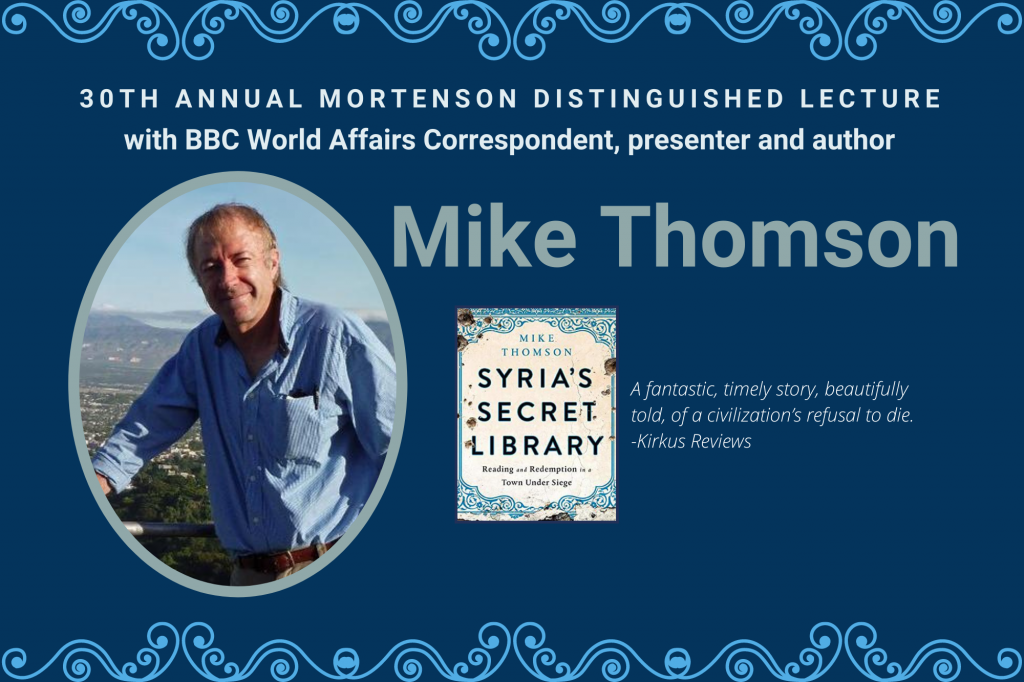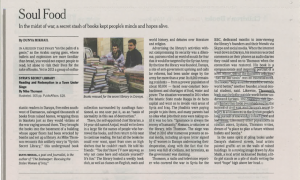30th Annual Mortenson Distinguished Lecture
Mike Thomson, BBC World Affairs Correspondent, Presenter and Author

CO-SPONSORED BY: Center for Global Studies through support from the US Department of Education’s Title VI NRC Program; Center for South Asian and Middle Eastern Studies; Department of Journalism, University of Illinois Urbana-Champaign; Mortenson Center for International Library Programs; School of Information Sciences; University of Illinois Library at Urbana-Champaign
Over the last two decades, Mike has memorably covered many of the world’s most newsworthy events, including the devastating 2010 Haiti earthquake, three US Presidential elections, the fall of Muammar Gaddafi and the death of Nelson Mandela. His agenda-setting reporting has taken him to many of the world’s biggest trouble spots. These range from Syria, Iraq and Afghanistan to Somalia, Eastern DR Congo, Darfur and the FARC controlled jungles of Colombia.
Mike has also carried out world exclusive interviews with North Korean government ministers in Pyongyang, worked undercover in Zimbabwe, Libya and Sudan and carried out highly acclaimed investigations into such harrowing subjects as North Sinai’s kidnapping trade, Sex trafficking in Ukraine, death squads in Honduras and Europe’s sweatshops of Southern India.
Mike has won more than twenty major awards for his work. These include: News Journalist of the Year (Sony Radio Academy 2012); Broadcast Journalist of the Year (One World Media Awards 2008) and War Correspondent of the Year (Prix Bayeux Calvados Awards 2008-Radio) These prestigious prizes are in addition to four Amnesty International Media Awards (three of them in consecutive years), five Sony Radio Academy Awards and four Foreign Press Association Awards.
Mike is also a renowned BBC presenter, Editor of: The Raqqa Diaries: Escape from ‘Islamic State’ (Hutchinson 2017) and author of Syria’s Secret Library (Orion 2019).
More information on Mike Thomson here.
About Syria’s Secret Library by Mike Thomson (from U.S. From Public Affairs)
Before writing and publishing Syria’s Secret Library: The True Story of How a Besieged Syrian Town Found Hope, Mike had two broadcasts on the BBC about it:
Syria’s Secret Library Radio 4 Crossing Continents
Broadcast August 1st 2016
Syria’s Secret Library BBC Online
Published July 28th 2016
Assad or We Burn the Country: How One Family’s Lust for Power Destroyed Syria BY SAM DAGHER. Little, Brown, 2019, 592 pp.
Syria’s Secret Library: Reading and Redemption in a Town Under Siege
BY MIKE THOMSON. Public Affairs, 2019, 320 pp.
These two books offer wildly contrasting portrayals of the regime of Syrian President Bashar al-Assad and the hugely destructive civil war that has raged in Syria since 2011. Dagher started reporting from Damascus for The Wall Street Journal in 2012. He interviewed key actors and dissidents, among them Manaf Tlass, once a close friend of the ruling Assad family. Manaf’s father was a regime stalwart, a longtime defense minister, and a key liaison between the Alawite Assads and the majority Sunni population of Syria. Manaf eventually defected from the regime after Assad brutally suppressed the largely Sunni opposition. Dagher tells a story of paranoia and unbridled violence. He is unequivocal in his condemnation of the Assad regime and catalogs the world’s acquiescence in the regime’s brutality, enabled in part by the focus on battling the Islamic State (or isis). Dagher interviewed some survivors of Assad’s torture centers, who afford hope for a better future, but otherwise, this book chronicles the triumph of evil.
Some of those torture survivors are the subject of Thomson’s moving chronicle of the four-year siege of Daraya, a suburb of Damascus that was once home to 90,000 people. Thomson, a BBC correspondent, learned that among those who remained in the suburb were a number of young Darayans who collected books to establish a secret, underground library, sheltered from the barrel bombs, snipers, and tanks of Assad’s forces. The library became the embodiment of both resistance and the hope for a more humane future. Thomson never visited Daraya and knew his heroes only through Skype and WhatsApp. Still, he became fast friends with the insurgent librarians. Rebels in Daraya held out for four years, enduring famine and trauma. In the summer of 2016, they were evacuated by the regime to Idlib province, which itself is now under attack by Assad’s forces. Syrian troops unearthed and looted the secret library.
Bashar al-Assad in 2011. It takes some mental gymnastics to see how Hezbollah’s role in Syria either mounts resistance to Israel or defends the territory of Lebanon. Daher has spent years in the Bekaa Valley close to Hezbollah strongholds. Her portrayal of the organization is rather sympathetic. The book’s strongest feature is its analysis of the charismatic appeal of Hezbollah’s secretary-general, Hassan Nasrallah. Daher’s superficial treatment of the organization’s finances— and the group’s consequent ability to eschew corruption and rent seeking—is less satisfying. The author refutes accusations of terrorism leveled at Hezbollah, particularly the findings of the international tribunal that investigated the 2005 assassination of former Lebanese Prime Minister Rafiq Hariri. She challenges the evidence that Hezbollah was behind this killing and other violent incidents.
